Hi! I'm Amanda, a 23 year old college student. I'm a third year student, currently studying a Bachelors Degree in Marketing Management.
Don't wanna be here? Send us removal request.
Text
tagged by @mid-afternoon-tea thanks for the tag :) I saw this last week and I thought I had scheduled it for Monday last week, turns out I scheduled it for this week...
appearance
i'm an i-need-to-pull-the-driver-seat-all-the-way-in kind of a person // i wear glasses // i have blonde hair // i prefer loose clothing to tight clothing // i have one or more piercings // i have at least one tattoo // i have blue eyes // i have dyed or highlighted my hair // i have gotten plastic surgery // i have or had braces // i sunburn easily // i have freckles // i paint my nails // i wear makeup // i don’t often smile // i am pleased with how i look // i prefer nike to adidas // i wear baseball hats backward
relationships
i am in a relationship (boyfriend, if you're reading this rn hi) // i have been single for over a year (my whole life) // i have a crush // i have a best friend i have known for ten years // my parents are together // i have dated my best friend // i am adopted // my crush has confessed to me // i have a long-distance relationship // i am an only child // i give advice to my friends // i have made an online friend // i met up with someone i have met online
hobbies & talents
i play a sport // i can play an instrument// i am artistic (gcse art lets gooo) // i know more than one language // i have won a trophy in some sort of competition // i can cook or bake without a recipe // i know how to swim // i enjoy writing // i can do origami // i prefer movies to t.v shows (i can’t commit to a tv show) // i can execute a perfect somersault // i enjoy singing // i could survive in the wild on my own // i have read a new book series this year // i enjoy spending time with friends // i travel during school or work breaks // i can do a handstand
aesthetic
i have heard the ocean in a conch shell // i have watched the sunrise// i enjoy rainy days // i have slept under the stars // i meditate outside // the sound of chirping calms me // i enjoy the smell of the beach // i know what snow tastes like // i listen to music to fall asleep // i enjoy thunderstorms // i enjoy cloud watching // i have attended a bonfire // i pay close attention to colours // i find mystery in the ocean // i enjoy hiking on nature paths // autumn is my favourite season
misc
i can fall asleep in a moving vehicle // i am the mom friend // i live by a certain quote // i like the smell of sharpies // i am involved in extracurricular activities // i enjoy mexican food // i can drive a stick-shift // i believe in true love // i make up scenarios to fall asleep // i sing in the shower (sometimes) // i wish i lived in a video game // i have a canopy above my bed // i am multiracial // i am a redhead // i own at least one dog // i have a cat
I am tagging @just-anightsoul @thatmusicgeek22 @coffeestainedprogress @yessy-studies-aba and anyone else who would like to do this tag. If I tagged you and you have already done it, I’m so sorry.
#THANKS FOR TAGGING ME#thanks for tagging <3#This was SUPER fun#mine#This was fun#thank you for the tag!
3 notes
·
View notes
Photo

Hui Ting’s Notion Templates (@sonderstudy)
hello everyone! due to requests, i’ll be sharing a couple of my notion templates! these will include: my weekly agenda, my module schedule, my reading tracker, my podcast track and my movies/tv shows tracker.
these templates are all stripped-down versions of what i use daily and they can be customized to however you like them to look. once you’ve clicked on the links, they will direct you to a copy of my template, which you can duplicate into your own personal notion workspace. thank you all for showing so much interest in my notion setup and i hope you enjoy using these!
List of Notion Templates Links:
Template Hub
Weekly Agenda Template
Class/Module Schedule Template
Reading Tracker Template
Podcast Tracker Template
Movie Tracker Template
Show Tracker Template
#mmandyreblogs#studyblr#student#university#notion#academia#notion template#notion setup#school#studying#studyblr college#productivity#resources#apps#tips#motivation#studyspo#sonderstudy
664 notes
·
View notes
Photo
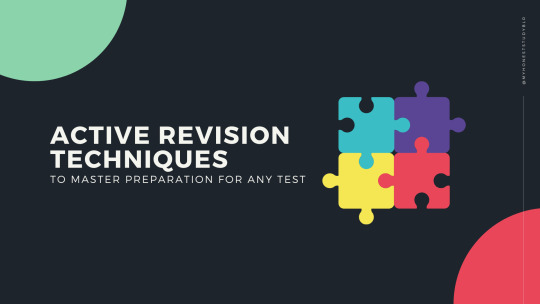
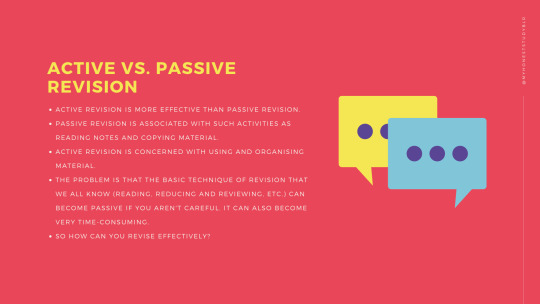
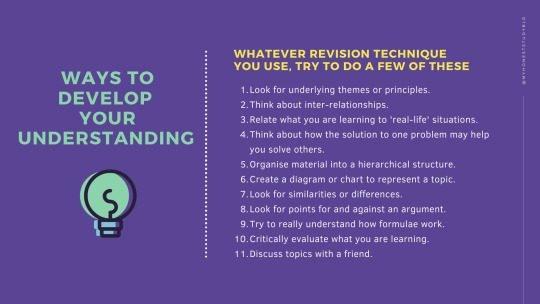
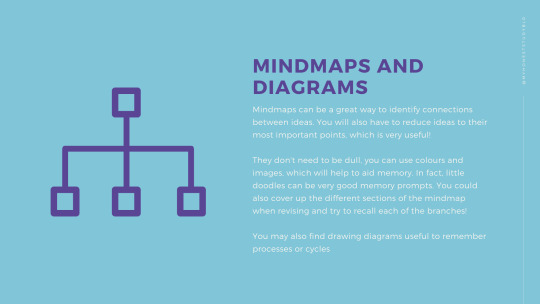
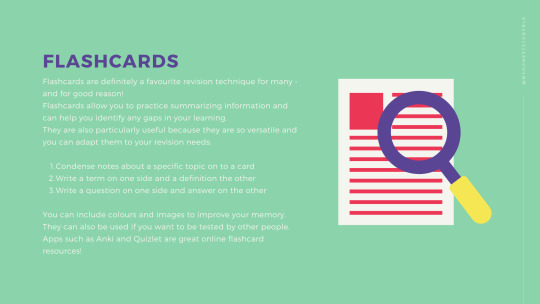
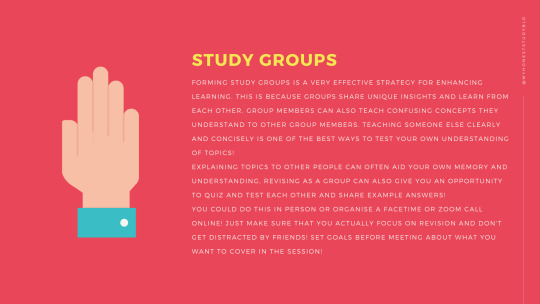
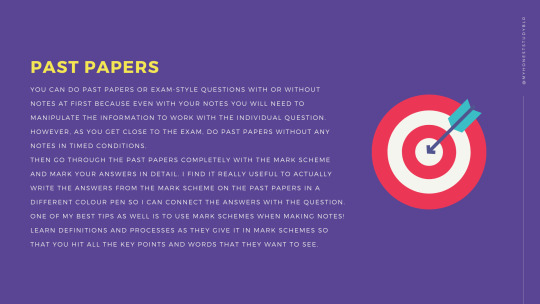
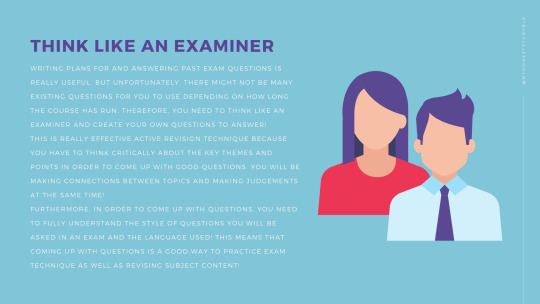
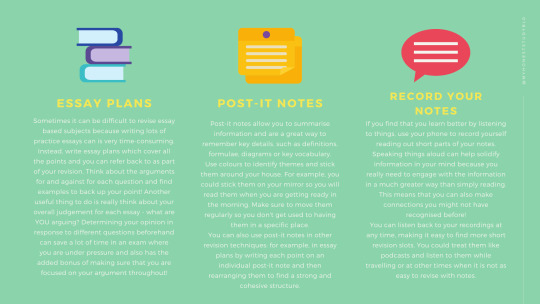
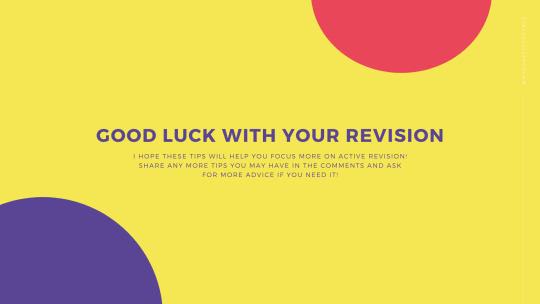
my masterpost | my studygram | ask me anything
[click images for high quality]
Other advice posts that may be of interest:
How To Stop Procrastinating
How To Study When You Really Don’t Want To
My Experiences With GCSEs
2K notes
·
View notes
Photo

my masterpost | my studygram | ask me anything
[click images for high quality]
Other advice posts that may be of interest:
How To Stop Procrastinating
How To Study When You Really Don’t Want To
Active Revision Techniques
1K notes
·
View notes
Text
College students can now get microsoft office for free
Just go here and sign up with your college email. You can install it on up to 5 PCs or Macs and on other mobile devices, including Windows tablets and iPads.
550K notes
·
View notes
Text
just to be clear, the fact that music was nominated for a golden globe is absolutely disgusting. every single (adult) involved in that gross, ableist movie should be sickened by themselves.
for those of you who don't know, music (2021) is a movie being directed by sia about a nonverable autistic girl. not only does it not include any actually autistic people in the movie itself but it also only took advice from autism speaks which is looked at as a hate group by the majority of the autistic community. leaked scenes have also shown the movie glorifying prone restraints which are incredibly dangerous and have resulted in major injuries and even death to disabled people as recently as last year.
autistic people just like me have been incredibly outspoken about how harmful this movie is but the allistic have been mostly silent. we are already seeing reviews calling this movie 'inspiring' and important' and it's absolutely horrific! we need your help calling this out. please stand with us and call out this disgusting display of disrespect to autistic folks.
💛 - your local actually autistic pal
p.s. please, please reblog if you aren't autistic.
#anti sia#golden globes#music#autism tag#autism speaks#autism#actually autistic#no golden globes for music
83K notes
·
View notes
Text
Hey did you know I keep a google drive folder with linguistics and language books that I try to update regularly
220K notes
·
View notes
Photo
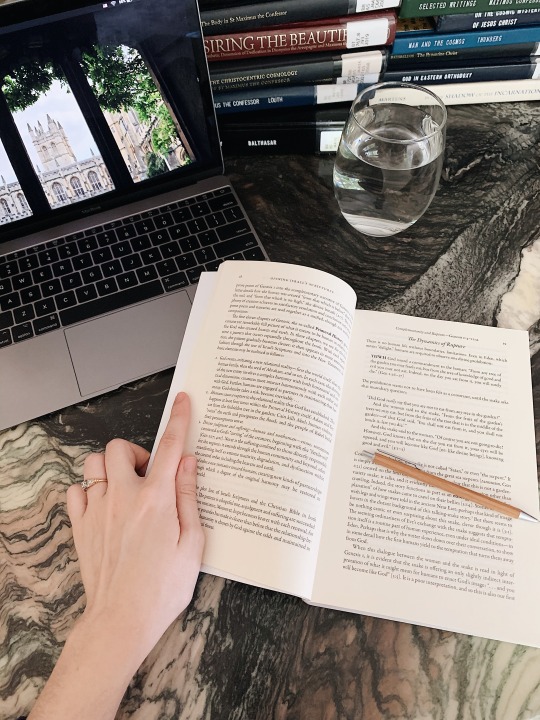
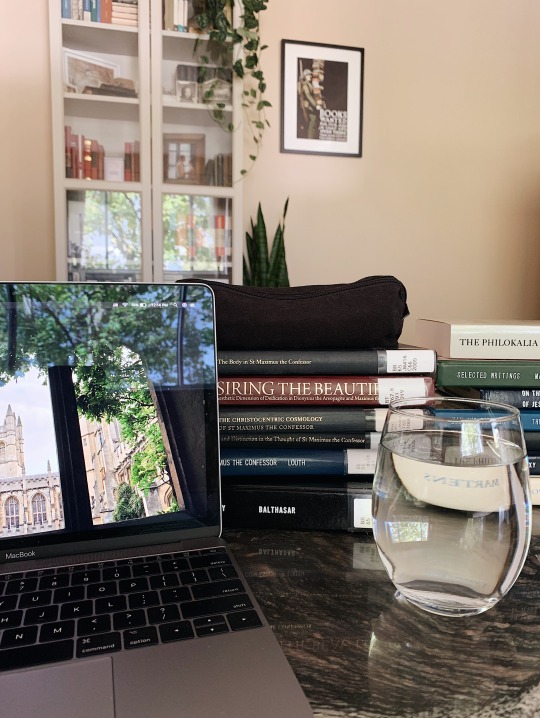
1 October 2020 | Popped back to the coffee table for reading today. My university library sent me piles of books to wade through for my research on Maximus the Confessor but before I get into those I need to finish up some Old Testament readings. Happy October, everyone!
2K notes
·
View notes
Text
Your bujo is super cute 💙💙💙


went hiking with friends last week and witnessing the richness of nature. i still can't believe we're slowly approaching to the end of the month. praying for an abundant week for everyone!
ㅡ
📔: the things you can see only when you slow down by haemin sunim.
298 notes
·
View notes
Photo
This is very useful for me too, since I am going to be a masters student myself... Thank you so much for this. ❤️❤️❤️

I am now a masters student…what?!
with this realisation, a feeling of dread can come about, as you believe everything done in undergraduate study is suddenly ‘not good enough’ for the big postgraduate world, full of long essays, big dissertations, and the longest academic year thus far!
but do not panic! please. the skills you gained throughout your undergraduate study are going to be incredibly helpful for the next year. you are more prepared than you think!
study tip number one: be flexible
this may seem like a very vague study tip, and I guess it is…but hear me out. what worked for me in first year didn’t work in second year, and when I thought I had mastered studying in second year, I had to change everything for third year. you may not have been through such a dramatic shift as I did, but I am sure at some points you thought to yourself, ‘is this actually working or am I doing it because I think I should?’.
I am a very stubborn person at the best of times, especially when it comes to studying, so I have found myself outright refusing to change a studying style for a particular module just because its worked for me in the past. It took me until my third year to learn that it is okay to change how you work best. now I realise, not only is it okay, but it should be encouraged! not one way of studying will work for everyone at all times, so don’t be scared of switching it up
study tip number two: timing is everything
I cannot do a lot of studying without breaks. I know that is not the case for everyone, as some people sit down and prefer to get their task done before so much as taking a breath! in my undergraduate, I quickly realised that I can get academic ‘burnout’ rather easily. If I spend too much time on one task, I get fed up, exhausted, and demotivated. this is when I discovered the pomodoro timing method, and now I couldn’t study without it!
essentially, it is a form of focused study which requires your full and complete attention on a task for a set period of time, with a set break after that timer is complete. when I had been practising this focused study for a while, I came up with a pattern that worked for me: 25 minutes with a 5 minute break for pre-readings, 50 minutes with a 10 minute break for essay preparation and writing. these timings could be completely different for you, depending on your ‘academic stamina’, but having that break has done my studying and mental health wonders!
study tip number three: technology is your friend (I promise)
we have access to so many incredible tools to help us study, stay motivated, and keep connected to other students. the last point is of course most important at this point, and I will explain how connections can be built and kept even while studying.
firstly, I must recommend an app that relates to the last tip. it is called forest, and it uses the pomodoro timing method but also grows a tree that dies if you leave the application. sometimes having your phone right in front of you is a very difficult distraction to avoid, so forest motivates you to stay off your phone while in a focused study session, and it’s very cute to see the different trees, shrubs, and flowers you can collect! it also has a group function, which helped my partner and I stay in touch on busy days apart.
now, connecting with others. unfortunately this will be more difficult this year. gone are the group study sessions in the library or at the cafe. but do not let this stop you from studying with your friends. of course video calling is a great way to keep up a conversation while studying, and i do recommend you do this when working on something less intensive (I find it impossible to read while someone is talking for example), but the company can do a lot for mental health and is a bonus if you’re all motivating each other to get work done.
group chats can be powerful tools too, especially if you have one centred around your course or certain modules. finding people in your classes that have a similar studying style to you can be really helpful when you need to motivate one another and give advice.
speaking of advice. there is so much advice available to you. through youtube channels, tumblr blogs, websites, leaflets. the most important thing i learnt in my undergrad study is not to be afraid of searching for help. i’ll say that louder for the people at the back…
don’t be afraid of searching for help.
40 notes
·
View notes
Text

8/100 Days of Productivity
I need to write a persuasive essay based on my major. I decided to go with autism in females. I'm autistic, so it's going to be interesting to learn more about myself as I research this topic.
22 notes
·
View notes
Photo

Study Techniques:
SQ3R Reading
The Pomodoro technique
Online Pomodoro timer
Feynman Technique
100 Things to do in your study break
Develop active learning strategies
Cramming (last minute option)
Study Methods, Tips, and Resources:
How to make flashcards (electronic and paper)
What to write on flashcards
Uses for flashcards
Creating and using mindmaps
Studying using textbooks
The benefits of textbooks
How to annotate
Tools for referencing
Tips for visual learners
How to read journal articles critically (by marielstudies)
Top 5 Study Tips to Achieve your Study Goals
How to pull an all nighter
How to pull an all nighter (2)
Studying vocabulary
Study guides
How to create a study guide (by studyspoinspo)
Using whiteboards
Assignment Calculator
Learning how to learn (by strive-for-da-best)
Get good grades (Youtube)
Memory:
Learn how to memorise and find the memory techniques that work best for you.
Here’s an interesting article about long term memory.
6 research tested ways to improve your memory.
Here’s an ask about how to memorise material.
An ask about forgetting material within a few hours.
Some memory tips (by astackoftextbooks)
Learn instead of memorising
Thinking and memorising
Time Management:
How to prioritise tasks
Apps for scheduling
Creating a revision timetable
A post about making a timetable (by grxeek).
How to keep your revision focused
An online study planner.
Motivation/Procrastination:
Reasons to study
Blocking apps/extensions for phones and computers.
Reasons to study now
10 tips for getting started on an academic task
How to deal with family distracting you from study
How to stop procrastinating (Youtube)
10 Tips for managing procrastination
Questions to ask yourself for motivation
How to improve your concentration
Quick concentration tips
Get Motivated (Wikihow)
Choosing the appropriate study environment
Short and sharp motivation
Stress Relief:
Stress relief techniques and ideas
The 10 Best Yoga Poses for Stress Relief
Relaxing Yoga Poses for Beginners
20 Easy Steps to Stress Relief
Relaxation Techniques
23 Science Backed Ways to Reduce Stress
25 Destressing Techniques
Deep Breathing Exercises
Three Guided Relaxation Videos
Vent Anonymously Online
A sleep calculator here which will calculate when you should go to sleep/wake up (depending on what you’re working out) based on sleep cycles. This will make sure that you wake up refreshed and ready to work.
Problems with sleep
Failure anxiety
Do nothing for 2 minutes
Calm (meditation site)
Health:
There’s also some information here about studying with mental illness from MIND.
There’s a really great post here about depression in university (by landofstories)
There’s a similar post here about studying with depression (by bloggerforstudentprogress)
Studying with ADHD
Studying maths with dyscalculia
Managing test anxiety
Self help: test anxiety
Emergency Compliment (for when you’re feeling down)
Studying with dyslexia
Revision and exams for people with dyslexia
Study skills for dyslexic students
How I coped with OCD at university
Study skills and OCD
Study skills and OCD PDF
Music:
Nature sounds in calmsound
Sounds of rain
Beethoven
Coffee shop sounds
More coffee shop sounds
Mix sounds (soundrown)
Sounds of the ocean
Whitenoise
Study mixes on 8tracks
Music to boost concentration
For the exam:
Exam preparation
Exam life hacks (by studyblob)
The best ways to prepare for exams
Exam tips
The day before an exam
Tips on Taking Multiple-Choice Tests
How to write a great essay (by englishlit-chic)
Psychology Essay Exams (gives an example and how to answer)
Looking after yourself after exams
Oral tests and exams
Writing and presenting a good speech
Links, Games, etc.:
Live panda camera (for destressing; you wouldn’t believe the amount of time I spend watching this camera).
Live animals
Try to find the ten gnomes
Origami
Create your own nebula
Easy magic tricks
DIY Home Spa (BY @recoverykitty)
Brownie in a cup
Cookie in a cup
79K notes
·
View notes
Photo

I just got a job as a writing tutor, and it inspired me to start a series of writing masterposts! From teaching college composition for two years at grad school and from working as a consultant at my university’s Writing Center, I’ve come to learn a few things about writing I’d like to share. Some of these tips may sound basic, and some may be fresh to you. Some may meet you exactly where you are. Regardless, these are some of the foundational aspects of good college writing.
I. Content & Style: Avoid Fluffy Language
Perhaps this is a symptom of trying to meet page minimums, but some students tend to inflate sentences with unnecessary adjectives. Similarly, they may puff up an essay with a useless statement, like, “Depression affects people in various ways.” What follows a sentence like this is usually a cataloging of the various/numerous/diverse ways in which depression affects people. Kill the middleman: that useless sentence. Be assured that most readers are astute enough to infer that depression affects people in many ways when you list said ways.
Language that sounds like that of a motivational speaker is maddening to most college instructors. “If you are true to yourself, you will be happy in life.” “Friends and family are the most important way to get the emotional support you need.” These are platitudes and overly generalize. Broad claims make for unoriginal writing; be specific and back up your claims with a logical argument, providing evidence for your opinion. Broad generalizations like, “Since the dawn of time, people have loved art” are just padding and detract from more interesting ideas you may have.
II. Description: Be Concrete and Concise
An easy way to avoid vague fluff is to use concrete images and concise language. First, if you can say something in five words instead of ten, that’s great! Go with the five. Second, concrete details provide a more refined image in the reader’s mind (car vs. Ford Taurus, for example) without the use of adjectives and adverbs. And try to avoid adverbs when you can. Show how a person is running “quickly” instead of telling the reader the person is running quickly. Is there sweat? Is this person bumping into others? Are the legs pumping like pistons? Specificity makes for much more interesting writing.
III. Organization: Make a Backwards Outline!
The best thing about outlines is that you ultimately do not have to follow them. Many people use the drafting process to think and come up with their best idea in the middle of the paper. But often the papers that are turned in are first drafts, so that great idea—around which you ought to have centered your paper—remains in the middle, not standing front and center and lacking enough space to develop further. If you’ve allowed yourself enough time to make a second/final draft, post-organize your paper. Map out the flow of your ideas and ask yourself if this is the best order and arrangement possible. Yes, revision is more work, but it is worth it. It is so, so, obvious to professors when a paper has not been properly organized.
IV. Grammar: Comma Splices
The most common grammatical error students make is the comma splice. A comma splice is the attachment of two sentences with only a comma. For example: “Harvey and Tim built a raft, they took it out on the river later.” ARGH. “Harvey and Tim built a raft” is a complete sentence, as is “they took it out on the river later.” How do you fix a comma splice? Well, there are three ways:
Use two separate sentences: “Harvey and Tim built a raft. They took it out on the river later.”
Add a conjunction after the comma: “Harvey and Tim built a raft, and they took it out on the river later.”
Use a semicolon: “Harvey and Tim built a raft; they took it out on the river later.
Standard/Edited (American) English grammar is the grammar of (American) academia and will be for a while. Also, simply, spelling and grammar mistakes only work to undermine your writing. If you have brilliant ideas, you shouldn’t obfuscate them with lousy grammar.
V. Language: Build Your Vocabulary
What does “obfuscate” mean? Well, when you encounter unfamiliar words, look them up and commit their meaning to memory. Practice using them, when appropriate. Of course don’t bloat your language so that your prose reads like a thesaurus. Your writing should sound intelligent/formal (with the help of new words), yet not awkward and stiff with the clumsy handling of “big” words.
VI. Scoring: Read What You Wrote Out Loud
This is pretty basic. Listening to your own writing will help you determine if it sounds stiff and/or unnatural or just awkward as hell. You can read your writing aloud to yourself, but it is best to hear another person read it. I refer to this section as “scoring” because writing has a musical aspect, too. Your use of language should be pleasing, made so by choosing the right word for the right moment, by opting for combinations of words that sound harmonious, and so that your delivery of ideas is arranged to have the most powerful impact. Choose a tone suited to your subject, and know thy audience. What will sound good to you may not sound so good for your intended audience. Adjust the score accordingly.
VII. Research: Do More of It Than You Think You Need To
Often you will be assigned a minimum number of sources for a research paper. Let’s say five, for example. Go for eight or nine. Of course you should avoid using redundant sources (a book on Samuel Beckett’s stage directions and journal article about Samuel Beckett’s stage directions). Find as many perspectives as possible; it’ll only make your arguments stronger. Plus the more academic writing you read, the more naturally it’ll come when you have to do your own.
VIII. Go Weird or Go Home
Another reason more using sources than required can help: finding unique perspectives/approaches to a subject. You may encounter some ideas that counter popular assumptions (peer pressure has some positive impacts; depression can sometimes benefit cognitive function; anti-drug education actually increases drug use). Another interesting tack to take is to go with a subject that often makes people uncomfortable, such as child sexuality, masochism, and alternatives to capitalism.
Strange, uncommon arguments are more interesting than broader overly researched topics, such as nature vs. nurture. A paper on the deliberate use of plot holes, in Mary Shelley’s Frankenstein, and their effect on narrator reliability would be far more interesting than the representation of capitalism in Animal Farm by George Orwell. The more complex and difficult the argument you choose the more critical thinking/writing skills you demonstrate. Weirdness is rewarded in academia, by getting your professor’s attention, by getting published in critical journals, etc. In this case, the axiom of “Be unique, and stand out in the crowd” stands true.
I hope this was helpful! Message me or send me an ask if you have any questions.
4K notes
·
View notes
Text
some helpful links for quarantine
For taking care of your health
How to fix your sleep schedule
The mandatory midday break
How to deal with study burnout
For when you can’t seem to get anything done
Staying focused: tips for maintaining focus while studying
Getting stuff done: how to deal with lack of motivation
How to beat procrastination
For organizing all the stuff you have to do
Energy management: a human-based organization method
Flexible time-blocking: a more breathable way to get things done
The ABCDE method: accomplish tasks more efficiently
Get organized with Notion: the all-encompassing productivity app
7K notes
·
View notes
Text

Today I’m doing something a little different for my 100 Days of Productivity / Day 11. Inspired by a reply I had on a @starsandaspirations (who’s super sweet and has a very cute blog!) post, I’m going to be detailing how I create my study schedule. It’s going to be rather detailed, so I’m going to put most of it under the cut.
1. Know when your large assignments are due.
As soon as I get my syllabus, I write down the dates of my major assignments, exams, and finals. I use a planner and a monthly calendar so that I know when my big deadlines are on the horizon.
Keep reading
#studyblr#studyinspo#studyspo#study motivation#study notes#university#college#study schedule#study plan#productivity#study productivity#mmandysreblogs#important
2K notes
·
View notes
